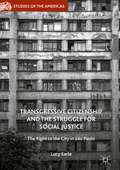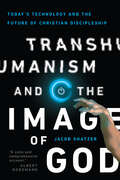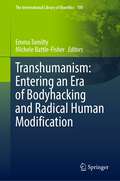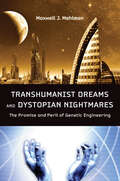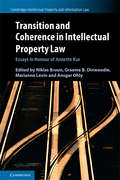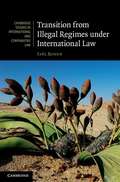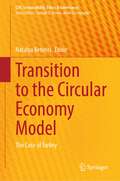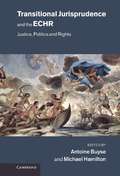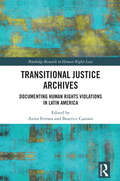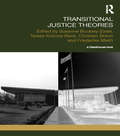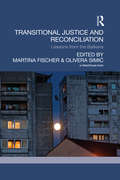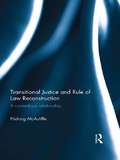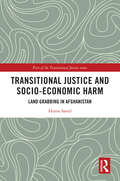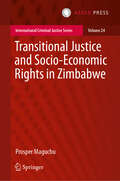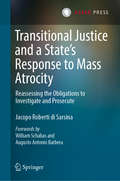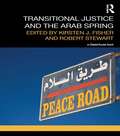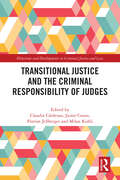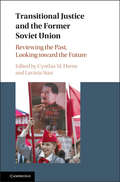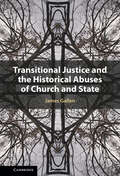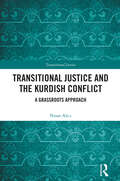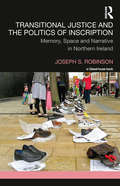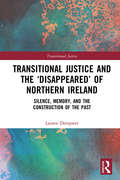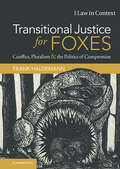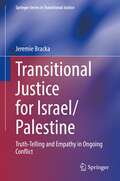- Table View
- List View
Transgressive Citizenship and the Struggle for Social Justice
by Lucy EarleThis book analyses the struggle for social justice in S#65533;o Paulo, Brazil. It takes the wave of protests that began in the city in 2013 as a starting point, and grounds them in the history of social movement mobilisation in urban Brazil. Drawing on ethnographic fieldwork with a federation of housing movements, this work demonstrates the ongoing relevance of the concept of the right to the city for social movements of the urban poor, and examines these movements' creative interpretation of national legislation to support their claims for housing and urban citizenship.
Transhumanism and the Image of God: Today's Technology and the Future of Christian Discipleship
by Jacob ShatzerWe're constantly invited to think about the future of technology as a progressive improvement of tools: our gadgets will continue to evolve, but we humans will stay basically the same. In the future, perhaps even alien species and intelligent robots will coexist alongside humans, who will grapple with challenges and emerge as the heroes. But the truth is that radical technological change has the power to radically shape humans as well. We must be well informed and thoughtful about the steps we're already taking toward a transhuman or even posthuman future. Can we find firm footing on a slippery slope? Biblical ethicist Jacob Shatzer guides us into careful consideration of the future of Christian discipleship in a disruptive technological environment. In Transhumanism and the Image of God, Shatzer explains the development and influence of the transhumanist movement, which promotes a "next stage" in human evolution. Exploring topics such as artificial intelligence, robotics, medical technology, and communications tools, he examines how everyday technological changes have already altered and continue to change the way we think, relate, and understand reality. By unpacking the doctrine of the incarnation and its implications for human identity, he helps us better understand the proper place of technology in the life of the disciple and avoid false promises of a posthumanist vision. We cannot think about technology use today without considering who we will become tomorrow.
Transhumanism: Entering an Era of Bodyhacking and Radical Human Modification (The International Library of Bioethics #100)
by Michele Battle-Fisher Emma TumiltyThis book surveys the distinctions that underlie the unbound potential and existential risks of life expansion and radical modifications posed by a transhuman world. Humanness is in flux as human bodies are being hacked and altered in their quest for super wellness, super intelligence and super longevity. Now is the time to discuss how best to think about dealing with bodies that have been hacked to exceed natural physical limits or more technically, species typical functioning. Enter the advent of transhumanism to take uncertainty by the horns. According to transhumanists, death is unnecessary and medical conventions undermine the possibility to radically evolve. To biohackers, there is no need to wait to explore the risks that conventional medicine dares not. This book is of interest to anyone interested in tapping into this growing movement of modifying the human body as it is right now.
Transhumanist Dreams and Dystopian Nightmares: The Promise and Peril of Genetic Engineering (Bioethics)
by Maxwell J. MehlmanWhat will happen when technology allows us to direct our own evolution?Transhumanists advocate for the development and distribution of technologies that will enhance human intellectual, physical, and psychological capacities, even eliminate aging. What if the dystopian futures and transhumanist utopias found in the pages of science journals, Margaret Atwood novels, films like Gattaca, and television shows like Dark Angel are realized? What kind of world would humans have created? Maxwell J. Mehlman considers the promises and perils of using genetic engineering in an effort to direct the future course of human evolution. He addresses scientific and ethical issues without choosing sides in the dispute between transhumanists and their challengers. However, Transhumanist Dreams and Dystopian Nightmares reveals that radical forms of genetic engineering could become a reality much sooner than many people think, and that we need to encourage risk-management efforts. Whether scientists are dubious or optimistic about the prospects for directed evolution, they tend to agree on two things. First, however long it takes to perfect the necessary technology, it is inevitable that humans will attempt to control their evolutionary future, and second, in the process of learning how to direct evolution, we are bound to make mistakes. Our responsibility is to learn how to balance innovation with caution.
Transition and Coherence in Intellectual Property Law: Essays in Honour of Annette Kur (Cambridge Intellectual Property and Information Law #55)
by Graeme B. Dinwoodie Niklas Bruun Marianne Levin Ansgar OhlyThe nature and content of intellectual property (IP) law, which is heavily contingent on the state of technology and on social and market developments, has always been subject to ongoing transitions. How those transitions are effected and the shape they take is crucial to the ability of IP to achieve its stated goals and provide the necessary climate for investment in creativity, innovation and brand differentiation. Yet the need for change can run headlong into a desire for coherence. A search for coherence tests the limits of the concept of “intellectual property,” is imperiled by overlaps between different IP regimes, and calls for a unifying normative theme. This volume assembles contributors from across IP and the globe to explore these questions, including whether coherence is desirable. It should be read by anyone interested in understanding the conceptual underpinnings of one of the most important and dynamic areas of the law.
Transition from Illegal Regimes under International Law
by Yaël RonenYaël Ronen analyses the international legal ramifications of illegal territorial regimes, namely the illegal annexation of territory or illegal declarations of independence, by reference to the stage of transition from an illegal territorial regime to a lawful one. Six case studies (Namibia, Zimbabwe, the Baltic States, the South African Bantustans, East Timor and northern Cyprus) are used to explore the tension between the invalidity of the illegal regime's acts and their effectiveness, with respect to the international relations of such territories, their domestic legal systems, the status of settlers and land transfers. Relying heavily on primary and previously unconsidered sources, she focuses on the international legal constraints on the post-transition regime's policy, particularly in the context of international human rights law.
Transition to the Circular Economy Model: The Case of Turkey (CSR, Sustainability, Ethics & Governance)
by Natalya KetenciThis edited volume provides a multisectoral, multidisciplinary analysis of the circular economy in Turkey. The chapters delve into different segments of the economy, monitoring the progress of the transition to circularity as it is occurring. Written by experts in the circular economy, chapters touch on different aspects of the sustainability transition—from AI and entrepreneurship to luxury fashion to green finance. Chapters also refer directly to applicable UN Sustainable Development Goals, noting the progress made towards related development targets. This volume will be of use to students, academicians, experts, and professionals interested and working on different aspects of circular and green economies.
Transitional Jurisprudence and the ECHR
by Michael Hamilton Antoine BuyseThe European Convention on Human Rights has been a standard-setting text for transitions to peace and democracy in states throughout Europe. This book analyses the content, role and effects of the jurisprudence of the European Court relating to societies in transition. It features a wide range of transitional challenges, from killings by security forces in Northern Ireland to property restitution in East Central Europe, and from political upheaval in the Balkans to the position of religious minorities and Roma. Has the European Court developed a specific transitional jurisprudence? How do politics affect the ways in which the Court's judgments are implemented? Does the Court's case-law itself become woven into narratives of struggle in transitional societies? This book seeks to answer these questions by highlighting the unique role of Europe's main guardian of human rights, the Court in Strasbourg. It includes a comparison with the Inter-American and African human rights systems.
Transitional Justice Archives: Documenting Human Rights Violations in Latin America (Routledge Research in Human Rights Law)
by Anita Ferrara Beatrice CanossiLatin America has amassed comprehensive expertise in generating, managing, and providing access to archives documenting widespread human rights violations. This book explores and traces the multiple pathways that led to the creation and production of transitional justice archives in selected Latin American countries. Examining how transitional justice mechanisms have gathered and organised evidence by way of comparing traditional methods used in previous cases with the innovations introduced by digital technologies, the work also shows that the methods used to produce and create transitional justice archives will significantly affect their future utilisation.Presenting the viewpoints of archivists, scholars, and professionals engaged in truth commissions and trials, it incorporates perspectives from diverse fields such as law, human rights, archival studies, history, anthropology, and criminology. The volume is divided into two parts. The first focuses on case studies from Argentina, Chile and Peru. Argentina and Chile have played a leading role in the development, management, and accessibility of extensive records documenting human rights abuses that occurred during the dictatorships in both countries. In the second part, academics and professionals of the Integrated System for Peace, Colombia's most recent transitional justice framework, discuss current challenges and developments in building the archives of the ongoing transitional justice process.This book will be of significant interest to researchers and academics of transitional justice and human rights, as well as archivists and historians specialising in human rights.
Transitional Justice Theories
by Susanne Buckley-Zistel Teresa Koloma Beck Christian Braun Friederike MiethTransitional Justice Theories is the first volume to approach the politically sensitive subject of post-conflict or post-authoritarian justice from a theoretical perspective. It combines contributions from distinguished scholars and practitioners as well as from emerging academics from different disciplines and provides an overview of conceptual approaches to the field. The volume seeks to refine our understanding of transitional justice by exploring often unarticulated assumptions that guide discourse and practice. To this end, it offers a wide selection of approaches from various theoretical traditions ranging from normative theory to critical theory. In their individual chapters, the authors explore the concept of transitional justice itself and its foundations, such as reconciliation, memory, and truth, as well as intersections, such as reparations, peace building, and norm compliance. This book will be of particular interest for scholars and students of law, peace and conflict studies, and human rights studies. Even though highly theoretical, the chapters provide an easy read for a wide audience including readers not familiar with theoretical investigations.
Transitional Justice after German Reunification
by Juan EspindolaHow do societies transitioning from oppressive to democratic rule hold accountable those citizens who contributed to maintaining injustice in the ancient regime by secretly denouncing fellow citizens? Is their public identification a way of fulfilling respect for those who suffered harm as a result of their collaboration? And is public identification respectful of denunciators themselves? This book pursues these questions through a multidisciplinary investigation focusing on the denunciators for the East German secret police and the Ministry of State Security and the way in which they have been publicly unveiled in contemporary German society. The book evaluates the justifications that social actors offer to support or oppose public identifications; how targeted collaborators react to this social practice; and whether it achieves its intended purpose. At every stage, the book asks whether the motivations and the consequences of public identifications honor or undermine the value of respect for people.
Transitional Justice and Reconciliation: Lessons from the Balkans
by Olivera Simic Martina FischerScholars and practitioners alike agree that somehow the past needs to be addressed in order to enable individuals and collectives to rebuild trust and relationships. However, they also continue to struggle with critical questions. When is the right moment to address the legacies of the past after violent conflict? How can societies address the past without deepening the pain that arises from memories related to the violence and crimes committed in war? How can cultures of remembrance be established that would include and acknowledges the victims of all sides involved in violent conflict? How can various actors deal constructively with different interpretations of facts and history? Two decades after the wars, societies in Bosnia, Serbia and Croatia – albeit to different degrees – are still facing the legacies of the wars of the 1990s on a daily basis. Reconciliation between and within these societies remains a formidable challenge, given that all three countries are still facing unresolved disputes either at a cross-border level or amongst parallel societies that persist at a local community level. This book engages scholars and practitioners from the regions of former Yugoslavia, as well as international experts, to reflect on the achievements and obstacles that characterise efforts to deal with the past. Drawing variously on empirical studies, theoretical discussions, and practical experience, their contributions offer invaluable insights into the complex relationship between transitional justice and conflict transformation.
Transitional Justice and Rule of Law Reconstruction: A Contentious Relationship
by Padraig McAuliffeThis short and accessible book is the first to focus exclusively on the inter-relation between transitional justice and rule of law reconstruction in post-conflict and post-authoritarian states. In so doing it provides a provocative reassessment of the various tangled relationships between the two fields, exploring the blind-spots, contradictions and opportunities for mutually-beneficial synergies in practice and scholarship between them. Though it is commonly assumed that transitional justice for past human rights abuses is inherently conducive to restoring the rule of law, differences in how both fields conceptualise the rule of law, the scope of transition and obligations to citizens have resulted in divergent approaches to transitional criminal trial, international criminal law, restorative justice and traditional justice mechanisms. Adopting a critical comparative approach that assesses the experiences of post-authoritarian and post-conflict polities in Latin America, Asia, Europe and Africa undergoing transitional justice and justice sector reform simultaneously, it argues that the potential benefits of transitional justice are exaggerated and urges policy-makers to rebalance the compromises inherent in transitional justice mechanisms against the foundational demands of rule of law reconstruction. This book will be of interest to scholars in the fields of transitional justice, rule of law, legal pluralism and peace-building concerned by the failure of transitional justice to leave a positive legacy to the justice system of the states where it operates. ‘This is a bold and nuanced scrutiny of the international system’s approach to transitional justice and the much vaunted rule of law project. Dr McAulifee should be congratulated for this well-researched book which should be a must read for not only scholars and researchers in transitional justice and peace and conflict studies, but also policy-makers in the international system.’ Dr. Hakeem O. Yusuf, Senior Lecturer, University of Strathclyde and author of Transitional Justice, Judicial Accountability and the Rule of Law.
Transitional Justice and Socio-Economic Harm: Land Grabbing in Afghanistan
by Huma SaeedMaintaining the importance of socio-economic issues in devising transitional justice mechanisms, this book examines the widespread practice of land grabbing in Afghanistan. On 3 September 2003, 100 armed police officers bulldozed around 30 homes in the Sherpur neighborhood of Kabul, Afghanistan, evicting over 250 people. Historically, the land was part of the property of the Ministry of Defense, of which a zone was allocated to the ministry’s employees who had built homes and had lived there for nearly 30 years. After the demolition, however, the land was distributed among 300 high-ranking government officials, including ministers, deputy ministers, governors and other powerful warlords. Land grabbing in Afghanistan has become a widespread practice across the country. Based on over 50 semi-structured interviews with key informants and group discussions with war victims and local experts in Kabul, the current book examines the relevance of transitional justice discourse and practice in response to this situation. Following a critical criminological concern with social harm, the book maintains that it is not enough to consider a country’s political history of violent conflict and the violation of civil and political rights alone. Rather, to decide on appropriate transitional justice mechanisms, it is crucial to consider a country’s socio-economic background, and above all the socio-economic harm inflicted on people during periods of violent conflict. This original and detailed account of the socio-economic challenges faced by transitional justice mechanisms will be of interest to those studying and working in this area in law, politics, development studies and criminology.
Transitional Justice and Socio-Economic Rights in Zimbabwe (International Criminal Justice Series #24)
by Prosper MaguchuThis book addresses the issue of corruption as a socio-economic rights concern at a national level. Zimbabwe’s widespread corruption inhibited its development in all aspects. It weakened institutions, especially those called upon to arbitrate political and economic contests, leading to potential human rights violations. However, Zimbabwe saw a change of government in November 2017. Due to this, there seemed to be an opening to work towards reform in relation to the anti-corruption architecture. Specifically, the new era provides an opportunity to review how accountability mechanisms (including but not limited to amnesties, truth commissions, institutional reforms and prosecutions) can address corruption as a socio-economic rights violation. As the new government still tries to address competing priorities, many moving parts and various matrixes, this volume in the International Criminal Justice Series provides a timely frame for revisiting the debate and developing the strategic thinking regarding transitional justice options in Zimbabwe. It will be of great interest to practitioners, policy makers, scholars and students in the fields of anti-corruption, socio-economic and human rights, and transitional justice. Prosper Maguchu is Visiting Assistant Professor at the Centre for the Politics of Transnational Law of the Vrije Universiteit Amsterdam, The Netherlands.
Transitional Justice and a State’s Response to Mass Atrocity: Reassessing the Obligations to Investigate and Prosecute
by Jacopo Roberti di SarsinaThis book brings a new focus to the ongoing debate on holding perpetrators of massive humanitarian and human rights violations accountable in countries in transition. It provides a clear-cut and comprehensive legal analysis of the content and nature of a state's obligations to investigate and prosecute as enshrined in the most important humanitarian and human rights treaties; it disentangles the common fallacy that these procedural obligations are naturally rooted and clearly spelled out in the general human rights treaties; and it explains the flaws in an absolutist interpretation. This analysis serves to understand whether such procedural obligations, if narrowly construed, act as impediments to countries emerging from periods of conflict or systematic repression in the face of contingent circumstances and the formidable dilemmas raised by a univocal understanding of justice as retribution.Exploring the latest instances of interpretation and application via an analysis of state practice, the jurisprudence of treaty bodies, international courts and tribunals, soft law instruments, and doctrinal contributions, the book also addresses the complex issue of amnesty, and other transitional justice mechanisms designed to restore peace and facilitate transition traditionally included in national reconciliation programs, and criticizes the contention that amnesty is always prohibited by international law. It also considers these problems from the viewpoint of the International Criminal Court, focusing on the cases of Uganda and Colombia after the 2016 peace agreement.Lastly, the volume offers a detailed analysis of techniques that may neutralize relevant obligations under international law, such as denunciation, derogation, limitation, and the public international law defenses of force majeure and necessity. Drawing attention to the importance of a multidisciplinary and practical approach to these unsettling questions, and endorsing a pluralistic notion of accountability, the book will appeal to legal scholars and transitional justice experts as well as practitioners, human rights advocates, and government officials.Dr Jacopo Roberti di Sarsina is an International Law Expert at the Alma Mater Studiorum - University of Bologna School of Law, and a dual-qualified lawyer (Italy and New York). He completed a PhD in public international law, label Doctor Europaeus, at the School of International Studies, University of Trento, holds an LLM from NYU School of Law, and read law at the University of Bologna.
Transitional Justice and the Arab Spring
by Robert Stewart Kirsten J. FisherThis book presents a varied and critical picture of how the Arab Spring demands a re-examination and re-conceptualization of issues of transitional justice. It demonstrates how unique features of this wave of revolutions and popular protests that have swept the Arab world since December 2010 give rise to distinctive concerns and problems relative to transitional justice. The contributors explore how these issues in turn add fresh perspective and nuance to the field more generally. In so doing, it explores fundamental questions of social justice, reconstruction and healing in the context of the Arab Spring. Including the perspectives of academics and practitioners, Transitional Justice and the Arab Spring will be of considerable interest to those working on the politics of the Middle East, normative political theory, transitional justice, international law, international relations and human rights.
Transitional Justice and the Criminal Responsibility of Judges (Directions and Developments in Criminal Justice and Law)
by Florian Jeßberger Claudia Cárdenas Jaime Couso Milan KuhliThis collective volume delves into the criminal responsibility of judges under authoritarian regimes, with case studies from Germany, Argentina, and Chile, examining their involvement in criminal human rights abuses and failures to protect victims from such crimes.Through comparative analysis, this volume offers insights into the legal and doctrinal challenges of prosecuting judicial involvement in crimes such as murder (‘judicial murder’), kidnapping, unlawful detention, and torture. Bridging a gap in transitional justice and international criminal law literature, it focuses on the rarely explored criminal responsibility of judges beyond judicial misconduct. In doing so, it provides readers with a deeper understanding of judicial roles in authoritarian regimes and the complex legal standards involved in prosecuting such cases. It also informs the ongoing discourse on judicial accountability and the potential legal implications for judges in contemporary contexts.Transitional Justice and the Criminal Responsibility of Judges is ideal for students, scholars, and civil servants or practitioners working in the domestic or the international criminal justice system.
Transitional Justice and the Former Soviet Union: Reviewing the Past, Looking toward the Future (Basees/routledge Series On Russian And East European Studies )
by Lavinia Stan Cynthia M. HorneIn the twenty-five years since the Soviet Union was dismantled, the countries of the former Soviet Union have faced different circumstances and responded differently to the need to redress and acknowledge the communist past and the suffering of their people. While some have adopted transitional justice and accountability measures, others have chosen to reject them; these choices have directly affected state building and societal reconciliation efforts. This is the most comprehensive account to date of post-Soviet efforts to address, distort, ignore, or recast the past through the use, manipulation, and obstruction of transitional justice measures and memory politics initiatives. Editors Cynthia M. Horne and Lavinia Stan have gathered contributions by top scholars in the field, allowing the disparate post-communist studies and transitional justice scholarly communities to come together and reflect on the past and its implications for the future of the region.
Transitional Justice and the Historical Abuses of Church and State
by James GallenIn this book, James Gallen provides an in-depth evaluation of the responses of Western States and churches to their historical abuses from a transitional justice perspective. Using a comparative lens, this book examines the application of transitional justice to address and redress the past in Ireland, Australia, Canada, the United States and United Kingdom. It evaluates the use of public inquiries and truth commissions, litigation, reparations, apologies, and reconciliation in each context to address these abuses. Significantly, this novel analysis considers how power and public emotions influence, and often impede, transitional justice's ability to address historical-structural injustices. In addressing historical abuses, power fails to be redistributed and national and religious myths are not reconsidered, leading Gallen to conclude that the existing transitional justice efforts of states and churches remain an unrepentant form of justice. This title is also available as Open Access on Cambridge Core.
Transitional Justice and the Kurdish Conflict: A Grassroots Approach (Transitional Justice)
by Nisan AlıcıCentralising the experience of victims-survivors and other grassroots actors, this book examines how transitional justice can be used in transforming the Kurdish conflict in Turkey.Despite 40 years of armed conflict, its violent effects on Kurdish people and the wider society, and strong demands for justice, there is little work on transitional justice in the context of the Kurdish conflict. In response, this book explores the limits and potentials of transitional justice in Turkey’s ongoing conflict by focusing on the perspectives of victims-survivors and grassroots justice activists. Such perspectives have received little attention in the transitional justice literature, even as it has exhibited an increasing interest in contexts where no formal transition has taken place. But, as this book demonstrates, the Kurdish conflict reveals the importance, not only of documenting these perspectives, but in seeing how those most affected by conflict are able to transform their experience into political action. Drawing on Kurdish victim-survivors’ own understandings of their experiences and activists’ perceptions of the potential of transitional justice, the book thereby addresses, and advocates, the transformative potential of bottom-up, grassroots-level efforts to deliver transitional justice goals.This book will appeal to transitional justice scholars and practitioners, those with interests in the role of social movements, as well as others with interests in the Kurdish conflict or in Middle Eastern politics more generally.
Transitional Justice and the Politics of Inscription: Memory, Space and Narrative in Northern Ireland
by Joseph RobinsonTaking Northern Ireland as its primary case study, this book applies the burgeoning literature in memory studies to the primary question of transitional justice: how shall societies and individuals reckon with a traumatic past? Joseph Robinson argues that without understanding how memory shapes, moulds, and frames narratives of the past in the minds of communities and individuals, theorists and practitioners may not be able to fully appreciate the complex, emotive realities of transitional political landscapes. Drawing on interviews with what the author terms "memory curators," coupled with a robust analysis of secondary literature from a range of transitional cases, the book analyses how the bodies of the dead, the injured, and the traumatised are written into - or written out of - transitional justice. The author argues that scholars cannot appreciate the dynamism of transitional memory-space unless they first engage with the often silenced or marginalised voices whose memories remain trapped behind the antagonistic politics of fear and division. Ultimately challenging the imperative of national reconciliation, the author argues for a politics of public memory that incubates at multiple nodes of social production and can facilitate a vibrant, democratic debate over the ways in which a traumatic past can or should be remembered.
Transitional Justice and the ‘Disappeared’ of Northern Ireland: Silence, Memory, and the Construction of the Past
by Lauren DempsterThis book employs a transitional justice lens to address the ‘disappearances’ that occurred during the Northern Ireland conflict – or ‘Troubles’ – and the post-conflict response to these ‘disappearances.’ Despite an extensive literature around ‘dealing with the past’ in Northern Ireland, as well as a substantial body of scholarship on ‘disappearances’ in other national contexts, there has been little scholarly scrutiny of ‘disappearances’ in post-conflict Northern Ireland. Although the Good Friday Agreement brought relative peace to Northern Ireland, no provision was made for the establishment of some form of overarching truth and reconciliation commission aimed at comprehensively addressing the legacy of violence. Nevertheless, a mechanism to recover the remains of the ‘disappeared’ – the Independent Commission for the Location of Victims’ Remains (ICLVR) – was established, and has in fact proven to be quite effective. As a result, the reactions of key constituencies to the ‘disappearances’ can be used as a prism through which to comprehensively explore issues of relevance to transitional justice scholars and practitioners. Pursuing an interdisciplinary approach, and based on extensive empirical research, this book provides a multifaceted exploration of the responses of these constituencies to the practice of ‘disappearing.’ It engages with transitional justice themes including silence, memory, truth, acknowledgement, and apology. Key issues examined include the mobilisation efforts of families of the ‘disappeared,’ efforts by a (former) non-state armed group to address its legacy of violence, the utility of a limited immunity mechanism to incentivise information provision, and the interplay between silence and memory in the shaping of a collective, societal understanding of the ‘disappeared.’
Transitional Justice for Foxes: Conflict, Pluralism and the Politics of Compromise (Law in Context)
by Frank HaldemannThere is a memorable line by ancient Greek poet Archilochus: 'The fox knows many things, but the hedgehog knows one big thing.' Drawing on this metaphor made popular by Isaiah Berlin, this book sets out to 'think like a fox' about transitional justice in an intellectual environment largely dominated by hedgehogs. Critical of the unitary 'hedgehog-like' vision underlying mainstream discourse, this book proposes a pluralist reading of the field. It asks: What would it mean for transitional justice to constructively deal with conflicts of values and interests in societies grappling with a violent past? And what would it imply to make meaningful room for diversity, to see 'the many' rather than just 'the one'?
Transitional Justice for Israel/Palestine: Truth-Telling and Empathy in Ongoing Conflict (Springer Series in Transitional Justice)
by Jeremie BrackaThis book applies the dynamic field of transitional justice to conflict resolution in Israel/Palestine. Around the globe, diverse societies have pursued truth-telling, restorative justice and reconciliation to end conflict -- yet the language of transitional justice has been all but absent in Israel/Palestine. This volume squarely addresses how transitional justice could contribute to conflict transformation and accountability, incorporating the questions of collective justice, memory, and human rights. It covers the most important historical and legal issues facing Israel/Palestine with a focus on civil societies in South Africa, Northern Ireland and Latin America. Ultimately, the book proposes an unofficial Israeli-Palestinian Truth and Empathy Commission (IPTEC) to address gross human rights abuses committed by both nations.Transitional Justice for Israel/Palestine will be of interest to researchers, NGOs, and policy makers working in transitional justice and societies with ongoing conflict.
